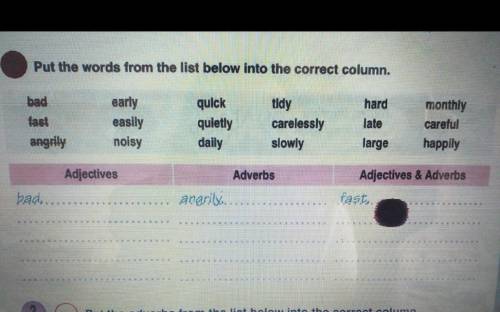Put the words from the list below into the correct column. bad tast angrily
early easily noisy
quick quietly daily
tidy carelessly siowly
hard late iarge
monthly careful
happily
Adjectives
Adverbs
Adjectives & Adverbs

Другие вопросы по теме Английский язык
Популярные вопросы
- Усплаві міді з оловом 45%становить мідь.скільки кілограмів міді містить злиток такого...
3 - Тема: координатная плоскость. 1: точки в(х; 3) и а(-2; 1) лежат на прямой перпендикулярной...
2 - Напишите пословицы к сказке о радже и птичке ....
3 - 8кв. дм 2 кв.см - 58 кв.см 96 кв. мм=...
3 - Какая начальная форма предлога? как изменяется предлог? неизменяемые признаки предлога....
3 - Анализ стихотворения есенина до свиданья. друг мой, до свидания...
2 - Какому числу равно произведение суммы и разности чисел 7ц2/5 и 4,2?...
1 - Какие методы были у м.а.бакунина,п.л.лаврова и п.н.ткачева?...
1 - Надо написать описание героев из сказки золушки на ....
2 - 1.почему растения в лесу не мешают друг другу? 2.какие правила необходимо знать...
1
Adverbs: angrily, easily, quietly, slowly, monthly, happily.
Adjectives & Adverbs: quickly, daily, carelessly.
To categorize the words correctly, we need to understand their meanings and functions in a sentence.
Adjectives describe or modify nouns or pronouns. They provide additional information about the noun or pronoun. For example, "bad" describes the quality of something, "early" describes the time of an event, "noisy" describes the level of sound, "tidy" describes the state of cleanliness, "hard" describes the level of difficulty, "late" describes the time of arrival, and "large" describes the size.
Adverbs, on the other hand, describe or modify verbs, adjectives, or other adverbs. They provide information about how, when, where, or to what extent an action is performed. For example, "angrily" describes the way someone expresses their anger, "easily" describes how something is done without difficulty, "quietly" describes the manner of speaking or moving with low volume, and "slowly" describes the speed at which something is done.
In this case, "quickly," "daily," and "carelessly" can be used both as adjectives and adverbs depending on their context. For example, "He is a quick worker" (adjective) and "He works quickly" (adverb), or "She made a careless mistake" (adjective) and "She did her work carelessly" (adverb).
If we put the words into the correct column:
Adjectives: bad, early, noisy, tidy, hard, late, large, careful.
Adverbs: angrily, easily, quietly, slowly, monthly, happily.
Adjectives & Adverbs: quickly, daily, carelessly.